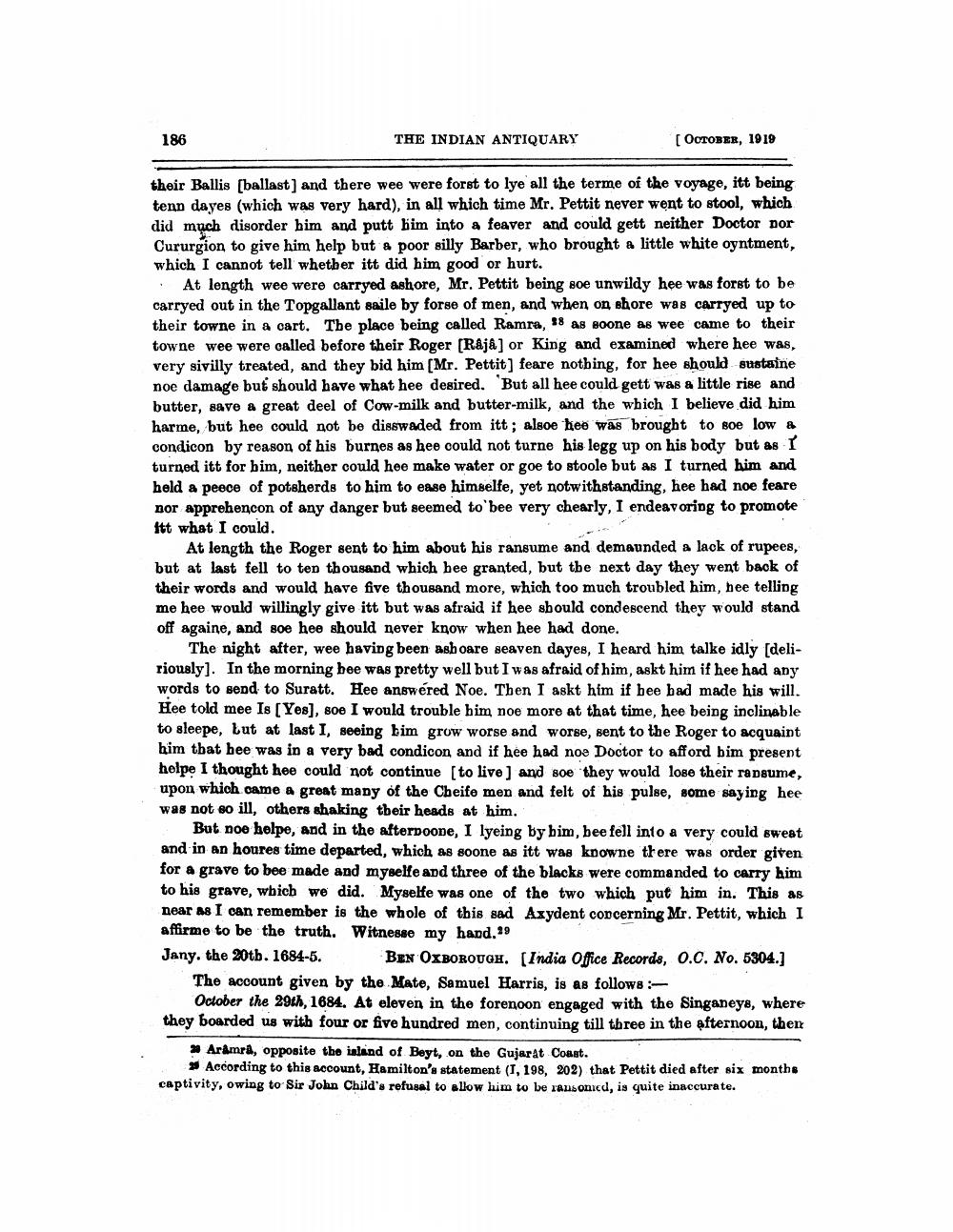________________
186
THE INDIAN ANTIQUARY
(OCTOBER, 1919
their Ballis (ballast) and there wee were forst to lye all the terme of the voyage, itt being tenn dayes (which was very hard), in all which time Mr. Pettit never went to stool, which did much disorder him and putt him into a feaver and could gett neither Doctor por Cururgion to give him help but a poor silly Barber, who brought a little white oyntment, which I cannot tell whether itt did him good or hurt.
At length wee were carryed ashore, Mr. Pettit being soe unwildy hee was foret to be carryed out in the Topgallant Baile by forse of men, and when on shore was carryed up to their towne in a cart. The place being called Ramra, 8 as soone as wee came to their towne wee were called before their Roger (Rájá] or King and examined where hee was, very sivilly treated, and they bid him (Mr. Pettit] feare nothing, for hee should sustaine noe damage but should have what hee desired. But all hee could gett was a little rise and butter, save a great deel of Cow-milk and butter-milk, and the which I believe did him harme, but hee could not be disswaded from itt; alsoe hee was brought to soe low & condicon by reason of his burnes as hee could not turne his legg up on his body but as I turned itt for bim, neither could hee make water or goe to stoole but as I turned him and held a peace of potsherds to him to ease himselfe, yet notwithstanding, hee had noe feare nor apprehencon of any danger but seemed to bee very chearly, I endeavoring to promote Itt what I could.
At length the Roger sent to him about his ransume and demaunded a lack of rupees, but at last fell to ten thousand which bee granted, but the next day they went back of their words and would have five thousand more, which too much troubled him, hee telling me hee would willingly give itt but was afraid if hee should condescend they would stand off againe, and soe hee should never know when hee had done.
The night after, wee having been ash oare seaven dayes, I heard him talke idly [deliriously). In the morning hee was pretty well but I was afraid of him, askt him if hee had any words to send to Suratt. Hee answered Noe. Then I askt him if bee bad made his will. Hee told mee Is (Yes), soe I would trouble him noe more at that time, hee being inclinable to sleepe, Lut at last I, seeing him grow worse and worse, sent to the Roger to acquaint him that bee was in a very bad condicon and if hee had noe Doctor to afford bim present helpe I thought hee could not continue to live ) and soe they would lose their ransume, upon which came a great many of the Cheife men and felt of his pulse, some saying hee was not so ill, others shaking their heads at him.
But noe helpe, and in the afternoone, I lyeing by bim, bee fell into a very could sweat and in an houres time departed, which as soone as itt was knowne there was order given for a grave to bee made and myselfe and three of the blacks were commanded to carry him to his grave, wbich we did. Myselfe was one of the two which put him in. This as near as I can remember is the whole of this sad Axydent concerning Mr. Pettit, which I affirme to be the truth. Witnesse my hand.a9 Jany. the 20tb. 1684-5. BEN OXBOROUGH, (India Office Records, 0.c. No. 5304.]
The account given by the Mate, Samuel Harris, is as follows:
October the 29th, 1684. At eleven in the forenoon engaged with the Singaneye, where they boarded us with four or five hundred men, continuing till three in the afternoon, then
* Aramra, opposite the inland of Beyt, on the Gujarat Coast.
According to this account, Hamilton's statement (1. 198. 202) that Pettit died after six months captivity, owing to Sir John Child's refusal to allow him to be rausonid, is quite inaccurate.




